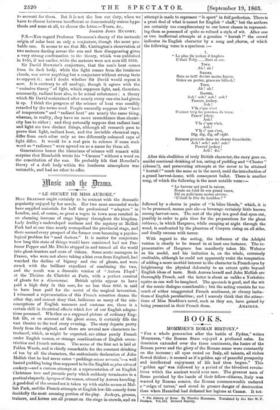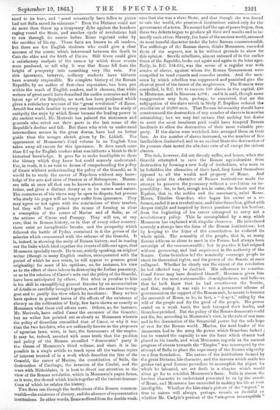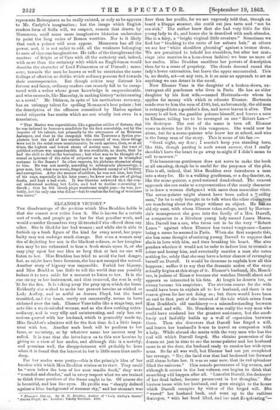BOOKS.
MOMMSEN'S ROMAN HISTORY.* " Fon a whole generation after the battle of Pydna," writes Mommsen, "the Roman State enjoyed a profound calm. Its dominion extended over the three continents, the lustre of the Roman power and the glory of the Roman name were constantly on the increase ; all eyes rested on Italy, all talents, all riches flowed thither ; it seemed as if a golden age of peaceful prosperity and intellectual enjoyment of life had then began." This "golden age" was followed by a period of the bloodiest revolu- tions which the ancient world ever saw. The greatest men of Rome perished by the hands of their fellow-citizens, Italy was wasted by Roman armies, the Roman commonwealth endured a "reign of terror," and stood in greater danger of destruction than when Hannibal had defeated her legions at Canine. It tot-
• The History of Rome. By Theodor Mommaen. Translated by the Rey. W. P. Dickson. Vol. HI. Richard Bentley. tered to its base, and " must necessarily have fallen to pieces had not Sulla saved its existence." Even the Dictator could not do more than throw up a temporary dyke against the breakers raging round the State, and another cycle of revolutions had to run through its course before Rome regained, order by the sacrifice of liberty. These facts are known to all readers, but there are few English students who could give a clear account of the events which intervened between the death to Cato the elder and the birth of Cicero. Still fewer could give a satisfactory analysis of the causes by which these events were produced, or tell why it was that Rome fell from the height of prosperity into something very like ruin. For this ignorance, however, ordinary students have hitherto been scarcely responsible. No complete history of the Roman Republic, by an author of first-class reputation, has been put within the reach of English readers, and it chances, that while writers of great merit have described the earlier centuries and the latest age of the Republic, no work has been produced which gives a satisfactory account of the "great revolution" of home. Arnold has made familiar to every one interested in the study of antiquity the steps by which Rome became the leading power in the ancient world, Mr. Merivale has painted the statesmen and generals who acted out their parts in the last scene of the Republic's decline and fall. But those who wish to understand intermediate scenes in the great drama, have • had no better guide than the meagre sketch given by Dr. Liddell. The appearance of Mommsen's third volume in an English form takes away all excuse for this ignorance. It does much more than fiil up for English readers what was hitherto a blank in their historical knowledge. It goes far to make intelligible to them the history which they knew but could scarcely understand. For, in truth, it is as vain to dream of comprehending the policy of Ctesar without understanding the policy of the Gracchi, as it would be to Study the career of Napoleon without any know- ledge of the acts and aims of Danton or of Robespierre. Momm- sen tells at once all that can be known about the Roman revo- lution, and gives a distinct theory as to its causes and nature. The correctness of his views may be open to dispute, but persons who study his pages will no longer suffer from ignorance. They may agree or not agree with the conclusions of their teacher, but they will have gained the means of Smelting as clear a conception of the career of Marius and of Sulla, as of the actions of Ctesar and Pompey. They will see, at any rate, that In Roman history, as in that of every other country. there exist no inexplicable breaks, and the prosperity which followed the battle of Pydna contained in it the germs of the miseries which commenced with the reforms of the Gracchi. It is, indeed, in showing the unity of Roman history, and in tracing out the links which bind together the events of different ages, that Mommsen specially excels. He is not, strictly speaking, an original writer (though to many English readers, unacquainted with the period of which he now treats, he will appear to possess great originality) for most of his opinions, as, for instance, his view as to the effect of slave-labour in destroying the Italian peasantry, or as to the relation of Cresar's acts and the policy of the Gracchi, have been anticipated by others. But what is peculiar to him is his skill in exemplifying general theories by an accumulation of details so carefully brought together, as at the same time to sug- gest and to justify the view which he inculcates. Many writers have spoken in general terms of the effects of the existence of slavery on the cultivation of Italy, few have shown so exactly as Mommsen what these evil effects were. Others, as, for instance, Mr. Merivale, have called Ctesar the successor of the Gracchi; but no writer has pointed out so clearly as Mommsen wherein the policy of Gracchus resembled that of Ctesar, or why it was that the two brothers, who are ordinarily known as the proposers of agrarian laws, were, in fact, the forerunners of the empire. It may be, indeed, asserted with some truth that the position and policy of the Roman so-called "democratic" party is the theme of Mornmseu's third volume, and since it is im- possible in a single article to touch upon all the various topics of interest treated of in a work which describes the fate of the Gracchi, the career of Marius, the constitution of Sulla, the destruction of Carthage, the invasion of the Cimbri, and the wars with Mithridates, it is best to direct our attention to the view of the Roman revolution, which in Mommsen's pages forms, as it were, the thread which binds together all the various transac- tions of which he relates the history.
Two flaws ran through the institutions of the Roman common- wealth—the existence of slavery, and the absence of representative institutions. In other words, Rome suffered from the double weak- ness that she was a slave State, and that though she was forced to rule the world, she possessed institutions suited only for the government of a town. No sooner hail the age of peace begun, than these two defects began to produce all their evil results and to in- tensify each other. Slavery, the bane of the ancient world, assumed its most baneful character tinder the later Roman commonwealth. The sufferings of the Roman slaves, thinks Mommsen, exceeded those of the negroes, nor is he without grounds to show for this opinion. Servile rebellions, almost unheard of in the earlier titnes of the Republic, broke out again Old again in its later ages. Sicily, in B.C. 134-132, was the scene of a regular war with armies of slaves, against whom the Rotnan Governinent were compelled to send consuls and consular armies. And the mea- sures by which rebellion was suppressed and punished give the clearest proof of the terror of the magistrates. The Romans were compelled, in B.C. 133 to execute 150 slaves in the capital, 450 in Minturnae, and in Sinuessa 4,000; and it is said, though some exaggeration may here, perhaps; be suspected, that on the subjugation of the slave revolt in Sicily 1'. Rupilitts ordered the crucifixion of 20,000 men. That Roman inhumanity should have countenanced the destruction of any number of slaves is in nowise astonishing; but we may feel certain that nothing but desire to avert the most imminent peril could have tempted Roman landlords to allow the destruction of their most valuable pro- perty. If the slaves were wretched, fate. avenged them on their foes. As the number of slaves increased, so the number of free landholders diminished, and in an ancient State the destruction of its yeoman class meant the absalute ruin of all except the richest classes.
The rich, however, did not directly suffer, and hence, when the Gracchi attempted to save the Roman agriculturists from destruction by forming a new body of freeholders, who were to be forbidden the alienation of their land, they found themselves opposed to all the wealth and property of Rome. And at this point the character of Roman institutious made the attempt to preserve the yeomanry without a revolution an um- possibility; for, in fact, though not in name, the Senate and the Equites, that is, the nobles and the merchavs, ruled Rome. Hence, Tiberius Gracchus, who began his career as a re- former, ended it as a revolutionist, and Caius Gra cell us, gifted with deeper insight and inspired by fiercer passions than his brother, from the beginning of his career attempted to carry out a revolutionary policy. This he accomplished by a step which Mommsen has explained with singular clearness. He introduced scarcely a change into the form of the Roman institutions; but by keeping to the letter of the constitution be violated its whole spirit. The assembly of the people, that is, as many Roman citizens as chose to meet in the Fortun, had always been sovereign of the commonwealth ; but in practice it had reigned without governing, and had acquiesced in the authority of the Senate. Caius Gracchus lel the nominally sovereign pbople to exert its theoretical rights, and the power of the Senate at once collapsed. Whether he clearly saw the extent of the revolution he had effected may be doubted. His adherence to constitu- tional forms may have deceived himself; Mommsen gives hint credit for the most statesmanlike clearsightedness, and believes. that he both knew that he had overthrown the Senate, and that, seeing it was vain to rest a permanent scheme of government on the support of the Roman mob, he meant to become the monarch of Rome, to be, in fact, a " despet," ruling by the will of the people and for the good of the people. His power rested on a weak basis, the mob betrayed their leader, and Gracchus perished. But the policy of the Roman democrats could not die, for, according to Mommsen's view, in the rule of one man and in the destruction of the Senatorial power lay the sole hope of rest for the Roman world. Marius, the next leader of the democrats, had in the army the power which Gracchus lacked ; but he wanted the capacity to use the force which chance had placed in his hands, and what Mommsen regards as the natural progress of events towards the "Empire" was interrupted by the attempt of Sulla to place the supremacy of the Roman oligarchy on a firm foundation. The nature of the institutions formed by the great Dictator, his character, and the reasons which made his genius and good fortune powerless to accomplish the object for which he laboured, are set forth in a chapter which would alone go far to establish Mommsen's fame. Sulla is almost the hardest character to understand presented to us by the annals of Rome, and Mommsen has succeeded in making his life at least intelligible. Whether the historian's picture of the "regent '' is true to nature will always, perhaps, remain as doubtful es whether Mr. Carlyle's portrait of the "sea-green incorruptible"
represents Robespierre as he really existed, or only as he appears to Mr. Carlyle's imagination ; but the image which English readers form of Sulla will, we suspect, remain that drawn by Mommsen, until some more imaginative historian undertakes to paint the long series of Roman worthies. Nor is it likely that such a painter will soon appear. Mommsen has an the power, and, it is not unfair to add, all the weakness belonging to men of vigorous imaginations. He talks of the thoughtsand the motives of Scipio or of Cato with all the certainty and, indeed, with more than the certainty with which an Englishman would describe the character of Lord Palmerston or of Disraeli ; more- over, towards the men he knows so well be entertains the same feelings of affection or dislike which ordinary persons feel towards their contemporaries. But though critics may distrust his fervour and fancy, ordinary readers can scarcely fail to be enrap- tured with a writer whose great knowledge is unquestionable, and who succeeds, like Macaulay, in making history "asinteresting as a novel." Mr. Dickson, in spite of his meritorious accuracy, has an unhappy talent for spoiling Mommsen's best points ; but the description of the offences committed by Marius against social etiquette has merits which are not wholly lost even in a translation.
"That Marius was superstitious, like a genuine soldier of fortune, that he was induced to become a candidate for his fint consulship, not by the impulse of his talents, but primarily by the utterances of an Etruscan haruapex, and that in the campaign with the Teutones a Syrian pro- phetess lent the aid of her oracles to the council of war, these things were not in the strict sense unaristocratic. In such matters, then, as at all times, the highest and lowest strata of society met; but the want of political culture was unpardonable. It was creditable, no doubt, that he had the skill to defeat the barbarians ; but what was to be thought of a consul so ignorant of the rules of etiquette as to appear in triumphal costume in the Senate ? In other respects, his plebeian character clung to him. He was not merely, according to aristocratic phraseology, a poor man, but, what was worse, frugal and a declared enemy of all bribery and corruption. After the manner of soldiers, he was not nice, but fond of his cups, especially in his later years ; he knew not the art of giving feasts, and kept a bad cook. It was likewise awkward that the con- sul understood nothing but Latin, and had to decline conversing in Greek ; that he felt Greek playa wearisome might pass—he was, pro- bably, not the only one who did so—but to confess the feeling of weariness was naive."
































 Previous page
Previous page